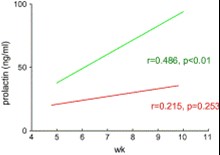I was amazed when I read this news today, in which they point out that a national survey showed that the majority of Americans are misinformed about the causes and frequency of miscarriages. According to Wikipedia, miscarriage is the spontaneous end of a pregnancy before fetal viability. It is the most common type of pregnancy loss, occurring in 10-25% of all clinically recognized pregnancies. This percentage is increasing with the tendency of couples to delay childbearing and have their babies at older ages. The postponement of pregnancy also increased the prevalence of recurrent miscarriages. Even though about one in four pregnancies end in miscarriage, most women never find out the cause of their loss. The reason for that is because tests and investigations are often done only if a woman had three or more miscarriages, given that most women are able to conceive again successfully after a miscarriage. Women usually tend to blame themselves and wonder what they did wrong to lose their child. This can bring deep social and psychological consequences to the couple trying to conceive.
In females, mutual interactions between the brain, anterior pituitary and the gonads orchestrate ovulation. Gonadotrophin-releasing hormone (GnRH) release from neurons located at the hypothalamus induces a preovulatory surge of luteinizing hormone (LH) that stimulates secretion of gonadal steroids. The steroids then regulate GnRH and LH secretion by positive and negative feedback mechanisms. This is the basic cycle to induce ovulation in women. However there is another hormone not so famous but also with a crucial role in female reproduction: Prolactin. In women, a major role of prolactin is to initiate and sustain pregnancy and lactation. During pregnancy there is an increase of prolactin secretion that is important for pregnancy maintenance. It has been shown that there is a correlation between prolactin levels and miscarriage occurrence. In other words, when prolactin levels fail to increase properly , there is a higher risk of miscarriages.

Fig. 1: Prolactin concentrations correlated with gestation week (wk) in successful pregnancies (green line) vs miscarriage (red line). Modified from Douglas and collaborators, 2010. (Link for the full review study here, and a free-PDF here)
However, hypersecretion of prolactin also causes infertility problems, since it inhibits GnRH release, and thereby suppresses LH secretion. Prolactin is secreted at high rates after stressful situations and also after extensive exercise. That’s why there’s a lot of sportswomen that find some difficulty to conceive. In a sense it seems that the body understands that if there is a period of stress going on, it is not wise to carry a pregnancy. So prolactin levels cannot be too high to allow ovulation and pregnancy to occur, but also have to increase at a proper rate during early pregnany to ensure pregnancy success. Not so easy, no?
Of course, there are many possible reasons for miscarriage and difficulty to conceive. But inadequate prolactin levels can be one of them. Sadly, prolactin levels are not measured unless after two episodes of miscarriage!!! Hopefully some of my research can change this and bring more light to prolactin!
